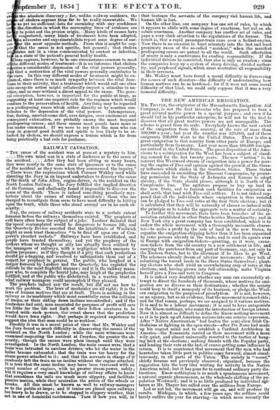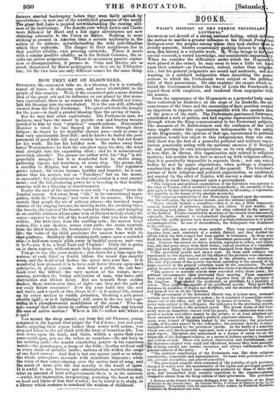THE NEW AMERICAN EMIGRATION.
Mn. Duran, the originator of the Massachusetts Emigration Aid Company, is not the first inventor who has proposed to turn a great natural motive power to a special purpose ; and even if he should fail in his particular enterprise, he will not be the first to diseover that all great motive powers arc not manageable. The scheme is grand from its scale. Everybody knows the vast extent of the emigration from this country, at the rate of more than 300,000 a year ; last year the number was 329,000, and of these emigrants 230,000 went to the United States. There is also a great emigration to that country from other parts ef Europe, and particularly from Germany. Last year more than 400,000 foreign- ers arrived in the United States. The great disposition of the Ame- ricans to a reamigration for the West has been a subject of stand- ing remark for the last twenty years. The new "notion" is, to convert this Westward stream of emigration into a power for mov- ing the engine of Free-soil opinion against the growth of the Slave- ry influence :which abides in the Southern States. Those States have succeeded in overriding the Missouri Compromise, by procur- ing permission for the State of Nebraska and Kansas to adopt slavery, if the State should please, although it is North of the Compromise line, The agitators propose to buy up land in the new State, and to furnish such facilities for emigration as shall settle that land with Free-soil settlers. It is not indeed sup- posed that all the individuals whose emigration is thus assisted can be pledged to Free-soil votes at the first State election ; but it is calculated that they will be naturally of classes so imbued with the principle as to render the aggregate vote a matter of certainty. To further this movement, there have been branches of the as- sociation established in other States besides Massachusetts ; and in New York city a great company has been established, which is to endow the whole movement with a thoroughly mercantile charac- ter—to make a profit by the sale of land in the new States, to organize the emigration-shipping better than it has been organized by some persons already in the trade, and to send its agents over to Europe with emigration-tickets—granting, as it were, excur- sion-tickets from the old country to a new settlement in life, and carrying the purchaser from any part of Germany, say, not only to the Eastern States, but to the allotment if he likes to go West. The schemers already dream of ulterior movements : they talk of colonizing the vacant lands in the Slave States themselves ; plant- ing electors who shall yield an overwhelming crop of votes at the elections and, having grown into full citizenship, make Virginia herself give a Free-soil vote to Congress. It is indeed very doubtful whether any man can successfully at- tempt to direct the hundreds of thousands, whose motives for emi- gration are as diverse as their destinations ; whether the society could keep to itself a monopoly of its business, or pledge the West- ern emigration to the purposes of proselytism. It is not, however, as an agency, but as an evidence, that the movement is remarkable; and for that reason, perhaps, we see assigned to it various motives. It is raid to be a labour movement; it is said to have antagonists in the Know-nothings, who resist the introduction of foreign labour. Now it-is almost as difficult to define the Know-nothing movement as it is to pack up all American notions into one concise expression. After "Native Americanism" had beaten the semi-alien Irish Ca- tholicism at fighting in the open streets—after Pio Nono had made up his august mind not to establish a Cardinal Archbishop in America—the Romanisth carried on their movement with a more wily quiet, and almost universally resorted to the tactics of hang- ing' back at the elections ; making friends with the Popular party, and lending their vote at the last, of course getting some influence in :return. It is to counteract that movement that the men who had heretofore taken little part in politics cattle forward, almost simul- taneously, in all parts of the -Union. The society is "secret," chiefly because not previously observed; organized, because the suggestion hits the very idea waiting for activity in the Native American mind ; but it has gone far to confound ordinary party dis- tinctions. Know-nothingism is as much a spontaneous Movement, a natural organic phenomenon, as the wholesale shifting of the po- pulation Westward; and it is as little produced by individual agi- tators is Mr. Thayer has called over the millions from Europe. Led or not led, the movement will go on, and will produce its results. Michigan, in which; a few years ago, the settlers could barely outlive the year for starving—in which more recently the
•
farmers aressted bankruptcy before they were fairly settle& by speculations—is now one of the established granaries of the world.
be great Salt .Lake is peopled notwithstanding the roaring silli- ness of its institutions. The deserkpver which Lewis and Clarke were „followed by Hunt and a few.,eager adventurers are now .claiming admission to the 17uion. as States. Nothing is more striking at present in America than a certain uniformity in the 'action of its citizens, notwithstanding the wild individualism which they cultivate. The danger te their neighbours lies in that positive vitality, ever pressing outwards. Where it meets with a similar Posifive viiality, s in the British Colonies, the re- suits are active cooperation. Where it encounters passive supine- ness or disorganization, it presses in. Cuba and Mexico are as much threatened by Know-nothingism as they are by Filibuster- lam; for the two iSna are only different names for the same thing.



























 Previous page
Previous page